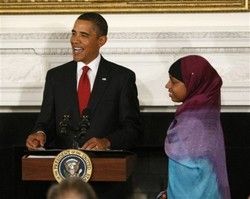...But Smooth Talk Feels So Good

Last week, Chairman of the Joint Chiefs of Staff Admiral Mike Mullen lambasted the Obama administration for basing diplomacy more on words instead of actions. "To put it simply, we need to worry a lot less about how to communicate our actions and much more about what our actions communicate," wrote Mullen.
Former U.S. undersecretary of state for public diplomacy and public affairs James K. Glassman now provides his own take:
The dangerous narrative in Muslim societies is that the United States and the West are out to destroy Islam. The way to counter that narrative is not to protest that the United States has clean hands and that if you really knew us you would love us -- but to change the subject entirely. The United States is the scapegoat, the animal on which all cares and hatreds are loaded. We only contribute to that way of thinking when we defend ourselves, or talk about ourselves at all.The accurate narrative, the one that strategic communications should promote, is that Muslim societies are today in the midst of profound change and upheaval.
There's clearly merit to both perspectives (Brookings Institute counter-terrorism expert Dan Byman certainly supports the Glassman analysis), but it seems naive to just dismiss the public diplomacy gains of the Obama administration. Videos like this of the United States President acknowledging Ramadan likely do wonders for the security of the U.S. beyond that which pundits or stats can acknowledge. Giving the world a little bit less of a reason to hate America, at little cost to U.S. blood and treasure, sounds like a good thing to me. In between politics and policy, there are people -- it's too bad that this is far too often forgotten.
(AP Photos)



